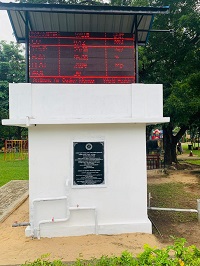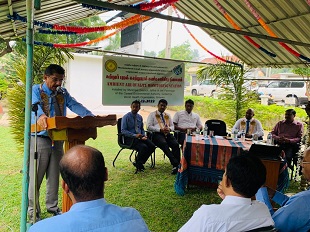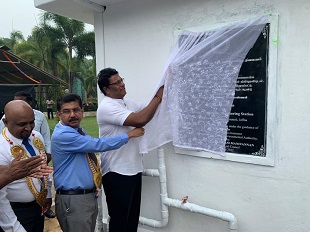
An ambient air quality monitoring station installed in Old Park, Jaffna
Air pollution is one of the greatest environmental challenges to human health and there is growing evidence of the negative health impacts of air pollution exposure. WHO’s Air Quality Monitoring Guidelines (2021) require countries to establish air pollution monitoring systems and enhance public access to air quality data. WHO has provided three ambient air quality monitoring stations to the Ministry of Environment on the World Health Day in April 2022 to enhance the availability of air quality data to inform efforts aimed at air pollution mitigation.
Damage inflicted on human health by air pollution
Exposure to high levels of air pollution can lead to several negative health outcomes, including an increased risk of heart disease, strokes, acute respiratory infections and lung cancer. Every year, exposure to air pollution is estimated to cause 7 million premature deaths globally. Both short- and long-term exposure is associated with adverse health impacts. Children, the elderly, and people with long-standing health conditions are more susceptible. Improving air quality can help mitigate climate change as well as protect health outcomes, especially for people living in low and middle-income countries suffering the highest exposures.
WHO Response
WHO Global Air Quality Guidelines (AQGs) 2021 provides robust evidence on the impacts of air pollution on human health, even at lower levels than previously understood, and recommends new air quality levels to protect health and mitigate global climate change by reducing levels of key air pollutants. WHO supports detailed health-related assessments of the different types of air pollutants to further the evidence base for advocacy on actions on air pollution. An integral component of assessing and reporting the impacts of air pollution is the public availability of ground-level air pollution data. Collection and auditing of data are imperative to enable countries to meet the SDG reporting criteria on air pollution-related indicators. According to the WHO AQGs 2021, the existence and operation of air pollution monitoring systems and public access to air quality data are critical for countries to develop and implement air quality management systems. The WHO Global Strategy on Health, Environment and Climate Change 2020 provides a vision on responding to environmental health risks and challenges through health protection and promotion, good public health standards, preventive action in relevant sectors and healthy life choices.[1]
WHO’s support to strengthening Sri Lanka’s air quality monitoring
In order to address the rising need for enhanced air quality monitoring, WHO Sri Lanka is supporting Sri Lanka on ambient air quality monitoring. Three such devices have been provided to the Ministry of Environment on World Health Day this year (April 2022), and are being installed in three cities: Jaffna, Anuradhapura and Kurunegala. Funds from the WHO South-East Asia Regional Office, the Norwegian Agency for Development Cooperation (NORAD), St. Jude Children’s Research Hospital and the United Nations Development Programme (UNDP) were utilized for this activity.
The ambient air monitoring stations will ensure a systematic, continuous and long-term monitoring of pollutant levels in the outdoor air to assess the extent of pollution and support the achievement of air quality standards. The stations provide real-time automated monitoring of key air pollutants including fine particulate matter and other gases. The air quality stations continuously monitor and display real-time data on the current air quality. The Central Environmental Authority and the Ministry of Environment, with the help of local authorities, prepared the infrastructure to house these three devices set up in the three cities.

Opening ceremony of Air Quality Monitoring Station in Open Park, Jaffna
The first of the air quality monitoring device was inaugurated in Jaffna by the Mayor, Jaffna Municipal Council, Mr Viswalingam Manivannan, along with the Secretary, Ministry of Environment, Dr Anil Jasinghe in Old Park on 7 December 2022. Officials from the Ministry of Environment, the Central Environmental Authority, the Ministry of Health and Jaffna Municipal Council, media personnel and the general public also attended the opening ceremony.
The availability of air quality data provides a strong evidence base for the evaluation of efforts aimed at air pollution mitigation and could be used for future epidemiological studies on the health effects of air pollution.
WHO will continue to work with the Government of Sri Lanka to further cross-governmental action and monitoring of air quality to address the growing challenge of air pollution. To advance clean air in the country, protect health and mitigate the impacts of climate change, governments will need to invest further resources to develop and implement air quality management systems.
